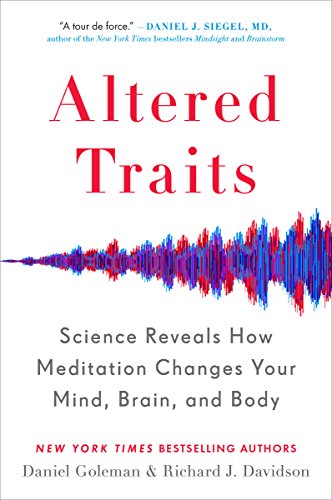Introduction: Meditation Beyond the Moment
Meditation is no longer just a spiritual or mystical practice—it has become a subject of rigorous scientific study. In Altered Traits, renowned psychologist Daniel Goleman teams up with neuroscientist Richard Davidson to explore what decades of meditation research reveal about the profound and lasting changes meditation can bring to our minds and bodies.
Unlike many books that focus only on the immediate, short-term effects of meditation, Altered Traits dives deep into the long-term, trait-level transformations that meditation can cultivate—those lasting changes in personality, brain function, and behavior that endure well beyond the cushion.
The Science of Meditation: Early Hype vs. Hard Evidence
Goleman and Davidson begin by addressing the explosion of meditation’s popularity in the West and the sometimes overenthusiastic claims that have accompanied it. They emphasize the importance of rigorous scientific validation and note that not all meditation practices—or even all meditation teachers—are equal.
The authors distinguish between:
- State effects: Temporary changes during or immediately after meditation (e.g., feeling relaxed or focused).
- Trait effects: Deep, enduring changes in brain structure, function, and behavior that persist long after meditation sessions have ended.
Altered Traits is primarily concerned with trait effects, which require years of dedicated practice and are more difficult to demonstrate scientifically.
The Brain on Meditation: Neuroplasticity and Lasting Change
One of the core messages is that meditation rewires the brain. Thanks to the brain’s plasticity, long-term meditation leads to structural and functional changes that can be measured with modern imaging techniques such as MRI and EEG.
Key findings include:
- Increased thickness in brain regions related to attention, emotional regulation, and self-awareness.
- Greater activation of the prefrontal cortex, associated with executive control and decision-making.
- Decreased activity in the amygdala, which plays a key role in fear and stress responses.
- Enhanced connectivity between brain networks that promote emotional balance and cognitive flexibility.
These changes underpin the enhanced emotional resilience, focus, and compassion that seasoned meditators often report.
From Monks to Modern Practitioners: Who Really Changes?
Goleman and Davidson draw heavily on research with elite meditation practitioners—monks and nuns with decades of experience—as well as long-term Western practitioners. These studies provide the most compelling evidence for altered traits.
For example:
- Tibetan monks trained in compassion meditation show increased gamma brainwave activity, associated with heightened awareness and neural synchrony.
- Experienced meditators demonstrate a remarkable ability to regulate their emotional responses, exhibiting less reactivity to negative stimuli.
- Even in older adults, meditation practice is linked to reduced age-related cognitive decline.
The book emphasizes that while benefits can be seen in beginners, deep, trait-level transformation typically requires sustained, long-term effort.
What Traits Are Altered?
Altered Traits identifies several key areas where meditation reshapes us:
- Attention and Focus
Meditation improves sustained attention and the ability to disengage from distractions. This doesn’t just help during meditation—it carries over to everyday life, improving productivity and reducing mind-wandering. - Emotional Regulation
Practitioners develop greater control over their emotional impulses. They’re less likely to be hijacked by anger, anxiety, or depression, and more able to maintain equanimity in challenging situations. - Compassion and Altruism
Certain meditation practices, like loving-kindness and compassion meditation, actually increase feelings of empathy and prosocial behavior. The brain’s empathy circuits become more active and better connected. - Self-Awareness and Sense of Self
Meditation helps dissolve rigid notions of self, reducing egocentric thinking and promoting a more fluid, interconnected experience of identity. - Physical Health
Beyond the brain, meditation influences the autonomic nervous system, reducing stress hormones, lowering blood pressure, and improving immune function.
The Role of Genetics and Personality
The authors caution that meditation isn’t a one-size-fits-all solution. Genetics and personality traits influence how easily someone benefits from meditation, and different meditation styles suit different individuals.
Some people naturally develop compassion more readily, while others may find mindfulness or concentration practices more accessible. This underscores the importance of personalization in meditation practice.
Overcoming Skepticism and the “Quick Fix” Culture
Altered Traits pushes back against the common notion that meditation is a quick fix for stress or a “miracle cure.” The scientific evidence supports that lasting change requires dedication over years—not weeks or months.
This is a crucial point in a culture obsessed with instant gratification. The authors advocate for a balanced view: meditation can lead to powerful transformations, but only with sustained, serious effort.
Practical Insights and Implications
Besides summarizing scientific findings, Goleman and Davidson offer practical insights for meditation practitioners and teachers:
- Consistency matters more than intensity: regular daily practice builds the foundation for altered traits.
- Start with mindfulness and concentration before progressing to more complex practices like compassion meditation.
- Teachers and supportive communities play a key role in helping practitioners stay motivated and deepen their practice.
- Scientific tools can help demystify meditation and dispel myths, promoting wider acceptance.
Meditation’s Potential for Society
Finally, the book considers meditation’s potential beyond individual transformation. The authors speculate that widespread adoption of meditation could foster:
- Greater social harmony through increased empathy and compassion.
- Reduced polarization as people develop better emotional regulation.
- Enhanced mental health on a societal scale.
- Improved leadership qualities in business and politics.
While optimistic, Goleman and Davidson remain realistic that this vision depends on overcoming significant cultural and institutional barriers.
Conclusion: Meditation as a Path to Real, Measurable Change
Altered Traits is a refreshing antidote to the hype and misunderstanding surrounding meditation. By combining decades of personal experience with a deep dive into scientific research, Daniel Goleman and Richard J. Davidson show that meditation is more than relaxation—it’s a practice that, with dedication, can profoundly rewire our brains, reshape our personalities, and improve our health.
For anyone curious about meditation beyond the buzzwords, Altered Traits offers a clear, authoritative, and hopeful guide to understanding how real, lasting transformation happens—inside the brain and throughout our lives.

Altered Traits: Science Reveals How Meditation Changes Your Mind, Brain, and Body
Daniel Goleman, Richard J. Davidson



